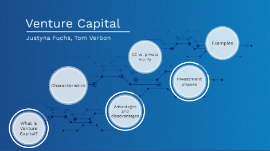Venture Capital
Transcript: http://www.investopedia.com/terms/v/venturecapital.asp http://financetrain.com/characteristics-of-venture-capital-funding/ Work Cited Capital Markets Definition | Investopedia. (2003). Retrieved August 22, 2016, from http: www.investopedia.com/terms/c/capitalmarkets.asp Characteristics of Venture Capital Funding - Finance Train. (2012). Retrieved August 22, 2016, from http://financetrain.com/characteristics-of-venture-capital-funding/ How to Finance Your Business Growth. (n.d.). Retrieved August 22, 2016, from http://www.thehartford.com/business-playbook/in-depth/venture-capital Venture Capital Definition | Investopedia. (2003). Retrieved August 22, 2016, from http://www.investopedia.com/terms/v/venturecapital.asp What are some of the disadvantages to taking venture capital? | Investopedia. (2015). Retrieved August 22, 2016, from http://www.investopedia.com/ask/answers/011915/what-are-some-disadvantages-taking-venture-capital.asp If I were to start my own business, as my source of business funding I would go for venture capital. This is because my startup company would be in the hands of investors who have already succeeded in the business world, and who can advise me with the best decisions for the future of my company based on their experiences. But beyond the financial and advisory support, the connections they could provide my company and I with is what I find most beneficial, because networking and getting your name and ideas out there, especially through the medium of successful investors, is the best way to make a business successful. Government grants are hard to earn, because firstly, there is a lot of paperwork and time-costing effort involved in applying for a grant, but also there is a lot of competition in applying for a grant, since there are tons of startup companies out there in the market. Government loans are not a great option for several reasons, some including that they only tend to give a certain amount of money to you based on your financial standing and success rates/predictions (meaning you might not get the amount of money you initially wanted), and that you would not have access to the money you have repaid back to the bank (so the only way of getting more money is applying for more loans). Leasing is not any better because it is considered an expense to your company (and long term leases considered debts), and because of the debt to your company, it may be difficult to apply for loans in the future. Thus, venture capital is the best option in my opinion. Work Cited Bat - 4M How It Works Venture Capital Obtaining Venture Capital Loss of Control: since VC capital investors who tend to be aggressive, put a lot at stake with large amounts of capital investments, they will want to have a strong say in the company, leading to a loss of control Minority Ownership Status: VC firms whom could have more than 50% stake in a startup company, may lead to loss of management control and essentially, loss of ownership Delays in Funding: some VC firms may refuse to provide funding until after certain milestones are met Iiliquidity: venture capital investors will usually have to wait until the company can be bought out or issue their initial public offering (sell their first public share/stock), making it difficult for investors to get out of the investment if things do not go well Long-term commitment: investors will have to wait about 3-5 years for a start-up to turn into a viable business Lack of competitor knowledge: start-up entrepreneurs, due to lack of experience, may generally have limited knowledge of their competitors and competitive market valuations Vintage cycles: in poor/stressed market conditions, even good firms may have a tough time finding a VC investor Extensive operation analysis and advice: good VC investors must be knowledgeable about both operating and financial analysis, and skilled enough to advise on both matters What is Venture Capital Characteristics For most startup businesses, venture capital is provided by HNWIs (high net worth individuals), who are also known as "angel investors", or venture capital firms. They generally look to invest in businesses that are well-managed, have a detailed business plan, and are growth-oriented. Since most angel investors are entrepreneurs that have succeeded in the business world themselves, they also tend to invest in businesses involved in same/similar industries that they are familiar with. 1. submit a business plan to venture capital firm or angel investor 2. If interested, the investor will perform due diligence (thorough examination of business model, products, operating history, management, etc.) 3. Investor proposes investment in return of company equity 4. With an active role in the company, the investor makes sure milestones are met before the next round of capital 5. Investor exits company after certain period of time (generally 4-6 years after initial investment) through merger, acquisition, or initial public offering

















